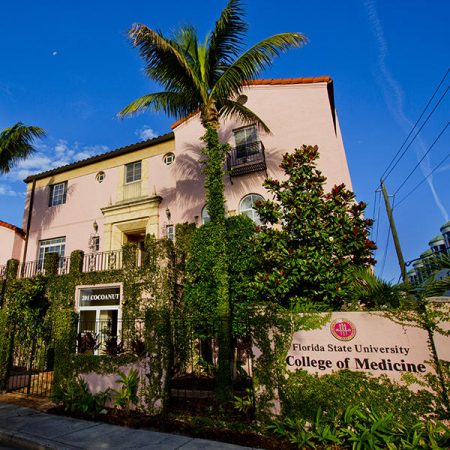
The Florida State University College of Medicine and Sarasota Memorial Health Care System unveiled plans to create an internal medicine residency program in Sarasota.
The program, expected to produce as many as 10 new internal medicine physicians a year when at full capacity, will be the first allopathic residency program between St. Petersburg and Fort Myers along Florida’s southwest coast. The area is in need of more physicians to take care of a population that grew by 20,000 people between 2010 and 2014 and is home to more than 100,000 residents age 65 and older.
“Ten years ago we brought medical education to Sarasota in a community-based approach that is the foundation for how we teach our medical students,” said John P. Fogarty, M.D., dean of the College of Medicine. “This year we are celebrating the 10th anniversary of our Sarasota Regional Campus. During this time we’ve built relationships throughout the local medical community, and the one we’ve developed with Sarasota Memorial has led us to this important next step.
“This new internal medicine residency program is a significant part of the commitment to producing future physicians for Sarasota and this entire region.”
The residency program will be based at Sarasota Memorial Hospital with the Florida State University College of Medicine as its institutional sponsor.
“Creating a residency program is the next logical step in Sarasota Memorial’s progression to becoming a teaching hospital, but it’s also an important move for our region,” said Steve Taylor, M.D., chief medical operations officer for Sarasota Memorial. “Without more residency programs, the physician shortage that Florida is experiencing will only worsen as our population swells and our existing physician workforce retires.”
First, the program will need to hire a director and apply for accreditation from the Accreditation Council for Graduate Medical Education (ACGME). If all goes according to plan, the program could begin taking applications from prospective residents as early as 2016 and admit its first residents in 2017.
Medical school graduates are required to complete residency training in their chosen specialty in order to gain board certification and become independently practicing physicians. Numerous studies have shown that most physicians end up practicing near where they completed residency training.
At present, Florida ranks 42nd nationally in its percentage of medical residents, despite being the third-most populous state in the country. Alaska, Idaho, Mississippi, Montana, Nevada, North Dakota, South Dakota and Wyoming – the only states with fewer per capita medical residents – have a combined population roughly half the size of Florida’s.
In an effort to provide more graduate medical education opportunities in the state, the FSU College of Medicine has partnered with a number of hospitals to sponsor new residency programs. In the past five years, the College of Medicine has sponsored new programs in Tallahassee (internal medicine) and Fort Myers (family medicine). In addition, programs in general surgery and dermatology are pending accreditation in Tallahassee, where Florida State also sponsors a fellowship for advanced training in procedural dermatology.
The new program in Sarasota will be the seventh residency program sponsored by Florida State.
“The College of Medicine commends Sarasota Memorial Health Care System for recognizing the return on investment to the patient community by training more primary care physicians,” said Joan Meek, M.D., associate dean for graduate medical education at the FSU College of Medicine.
“The reality is that health care cannot be provided to those who need it without enough providers to do the job,” Meek said. “Sarasota Memorial understands that reality.”
Third- and fourth-year students from the medical school’s Sarasota campus do clinical rotations on a year-round basis under direct supervision of community physicians at area health centers and physician offices, including Sarasota Memorial.
To date, 795 physicians have graduated from the FSU College of Medicine, which first accepted students in 2001. Internal medicine and family medicine are the top two residency program choices for College of Medicine alumni.




